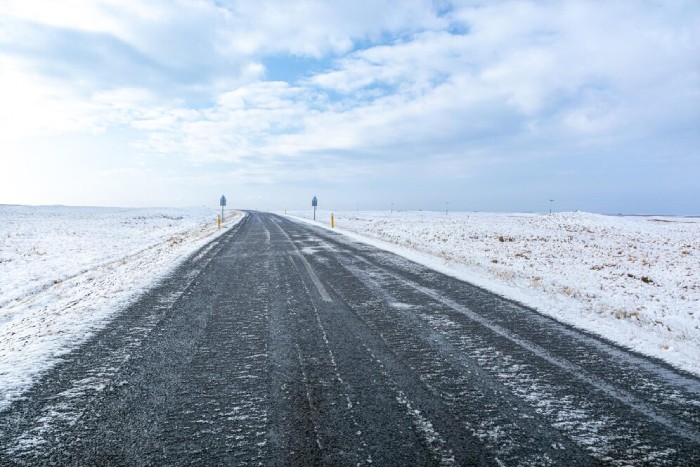The success of any asphalt paving project depends heavily on weather conditions, particularly in cold climates. Whether planning a driveway or parking lot, understanding the right techniques is essential to ensure smooth and durable pavement. In this guide, we’ll explore the best practices for asphalt paving in cold climates, covering basic methods like cold-mix asphalt, proper compaction, and ways to protect your pavement during winter.

Challenges of Asphalt Paving in Cold Climates
The Impact of Cold Temperatures on Asphalt
Cold weather significantly affects asphalt’s durability and workability. When temperatures drop below 40 degrees Fahrenheit, the cooling rate of asphalt accelerates, making it harder to achieve proper compaction. Poor compaction leads to weak pavement prone to cracks and potholes, compromising the longevity of your project.
Freeze-Thaw Cycles and Asphalt Damage
In colder climates, repeated freeze-thaw cycles are a common culprit for asphalt damage. Water penetrates the pavement surface, freezes, and expands, causing cracks and potholes to form. Without timely maintenance, this can escalate into severe structural damage.
Best Practices for Cold Weather Asphalt Paving
1. Choose the Right Type of Asphalt
When paving in cold climates, selecting the appropriate asphalt mix is crucial.
- Hot-Mix Asphalt: Delivered at high temperatures, hot-mix asphalt is ideal for warmer conditions but can cool too quickly in cold weather, making compaction difficult. For cold climates, warm-mix asphalt or cold-mix asphalt may be better options.
- Cold-Mix Asphalt: Designed for low temperatures, cold-mix asphalt remains workable for longer periods, ensuring better compaction. It’s particularly effective for smaller projects like patching cracks and potholes.
2. Preheat the Surface and Equipment
Preheating the pavement surface helps maintain the temperature of the asphalt for longer, improving compaction. Using infrared heaters can also prevent the asphalt from cooling prematurely. Additionally, ensure that rollers, pavers, and other equipment are warm before use.
3. Optimize the Compaction Process
Proper compaction is essential for smooth and durable pavement. In cold weather:
- Work quickly to compact the asphalt before it cools below 175 degrees Fahrenheit.
- Use heavy rollers to achieve uniform density and avoid weak spots.
- Ensure consistent monitoring of the compaction temperature to prevent issues related to cold air exposure.
4. Apply Sealcoating for Protection
Sealcoating protects against snow, ice, and de-icing chemicals, which can degrade asphalt. Applying a sealcoat during fall can help prepare your pavement for the winter months, reducing the risk of freeze-thaw damage.
Essential Cold Weather Techniques for Paving Projects
Use of Warm-Mix Asphalt
Warm-mix asphalt is a versatile option for cold-weather paving. With lower production temperatures than hot-mix asphalt, it remains workable in colder climates while reducing energy consumption.
Proper Delivery and Placement
Cold weather requires meticulous planning to deliver and place the asphalt promptly. Ensure that:
- The asphalt is transported in insulated trucks to retain heat.
- Placement occurs as quickly as possible to avoid cooling before compaction.
Maintenance Tips for Winter Weather
To maintain the durability of your pavement during winter:
- Regularly remove snow and ice to prevent water infiltration.
- Use de-icing agents sparingly to avoid damage to the pavement surface.
- Repair cracks immediately to mitigate damage caused by freeze-thaw cycles.
Cost Considerations for Asphalt Paving in Cold Climates
The cost of an asphalt paving project varies depending on the size and materials used. For instance, a 20×20 asphalt driveway typically costs between $1,200 and $2,400, depending on factors like the type of asphalt and the complexity of the paving operation. Cold weather techniques, such as preheating equipment or specialized asphalt mixes, may slightly increase costs but are essential for long-lasting results.
Why Choose Professionals for Cold Weather Asphalt Paving?
Paving in cold climates requires specialized knowledge and equipment to achieve optimal results. Experienced contractors understand the intricacies of asphalt paving needs during challenging weather conditions, ensuring the pavement is compact, durable, and ready to withstand winter weather.
At JR Paving & Construction Co. Inc., our team of experts is equipped to handle all your asphalt paving requirements, whether it’s a tar and chip driveway or a large commercial project. We use industry-leading practices to deliver superior results, even in the harshest conditions.
Ensure Durable Pavement in Any Weather
Cold climates present unique challenges for asphalt paving, but your pavement can remain smooth and durable for years with the right techniques and maintenance strategies. Whether you need a tar and chip driveway or comprehensive paving solutions, JR Paving & Construction Co. Inc. is here to help.
📞 Call us today at 800-888-9833 for a free consultation.
🌐 Visit our website to learn more about our services and explore how we can meet your asphalt paving needs in cold weather conditions.
Protect your investment with quality asphalt paving—your pavement deserves the best, no matter the weather!



